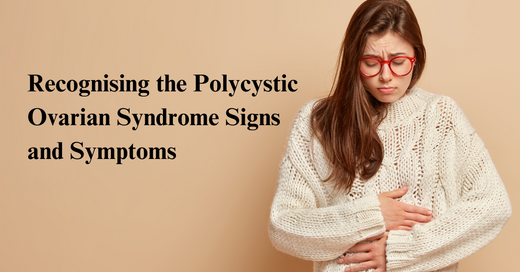
Recognising the Polycystic Ovarian Syndrome Signs and Symptoms
Share
Living with Polycystic Ovarian Syndrome (PCOS) may feel like an ongoing struggle because of the emotional toll it takes in addition to the physical symptoms. The unpredictability of symptoms—such as irregular menstrual cycles, fluctuations in weight, and dermatological concerns—can be both overwhelming and disheartening. It may often make you feel isolated in your experiences, particularly when the condition may contribute to difficulties related to fertility and self-esteem. However, it is essential to acknowledge that these experiences are legitimate, and seeking support from healthcare professionals, friends, and support groups can significantly enhance one's well-being.
Table of Contents
Polycystic Ovarian Syndrome Symptoms

The symptoms of PCOS can vary greatly in severity, and not all women with the condition will have them all. Let us examine a few of the typical symptoms associated with polycystic ovarian syndrome.
- Periods that are irregular or absent altogether
- Difficulty becoming pregnant, typically due to irregular or nonexistent ovulation
- Growth of hair in unwanted places (such as your buttocks, back, chest, or face)
- Increase in weight
- Hair loss or thinning on your head
- Acne or oily skin
- Skin patches that are thick or dark under the breasts, in the armpits, and on the back of the neck
If you experience any of these symptoms, it is best to talk to your doctor about PCOS. This is especially important for those who are trying to conceive, as PCOS is one of the main causes of infertility in women.
Causes of Polycystic Ovary Syndrome (PCOS)
Although the exact cause of Polycystic Ovary Syndrome (PCOS) is unknown, a number of factors may be involved in its development:
- The body reacts to insulin resistance by producing more insulin, which can raise testosterone levels. Insulin resistance is the result of cells that do not respond to insulin as well, which raises blood sugar levels. This hormonal imbalance can interfere with ovulation, affecting the release of eggs from the ovaries.
- Low-grade inflammation occurs when white blood cells are activated in response to infection or injury. People who have PCOS frequently have this ongoing inflammatory condition.
- An excessive amount of androgen, The ovaries may produce a lot of androgen when PCOS is present. An excess of androgen prevents ovulation, which means that eggs do not develop regularly or emerge from the follicles where they develop. Acne can also be caused by excess androgen.
- Genetics and family history of the disorder may contribute to the development of the condition.
Polycystic Ovary Syndrome Symptom Test

Polycystic ovary syndrome (PCOS) cannot be diagnosed with a single test. Healthcare providers typically begin by discussing symptoms, medications, and medical history, including menstrual patterns and weight changes. A physical exam may reveal signs of excess hair growth, insulin resistance, and acne. To further evaluate for PCOS, providers may recommend:
- Examining the pelvis for irregularities in the reproductive system
- Blood tests to measure hormone levels, evaluate cholesterol, triglycerides, and glucose response, and rule out other causes of irregular menstruation or excess androgen.
- Ultrasound to check the lining of the uterus and the ovaries.
Polycystic Ovary Syndrome Symptoms Treatment
A number of factors, including your age, the severity of your symptoms, and your general health, can affect how you are treated for PCOS.
- Maintaining a healthier diet and getting regular exercise can help you reduce weight, manage your symptoms, improve insulin utilisation, lower your blood sugar, and possibly even trigger your menstrual cycle.
- Certain medications can stimulate your ovaries to release eggs in the proper manner if you wish to become pregnant. However, there are certain risks associated with these, such as an increased likelihood of having twins or more and the potential for ovarian hyperstimulation, which is an excess of hormone production by the ovaries.
- If you are not trying to get pregnant, birth control pills might be a part of your treatment plan.
Lifestyle and Home Remedies for PCOS
Polycystic Ovarian Syndrome (PCOS) symptoms can be managed with home remedies as an alternative treatment. Here are some simple suggestions to think about if you want to manage PCOS.
- Losing weight may help bring down your levels of testosterone and insulin, as well as possibly restart your ovulation cycle. See your doctor about a program that suits your needs if you are having trouble losing weight, and think about scheduling a consultation with a dietitian for advice.
- A low-carb diet may be a good fit for you; ask your doctor if eating a lot of carbohydrates can cause your insulin levels to spike. When you do eat carbs, go for the complex ones found in fruits, veggies, whole grains, and beans; they're better for keeping your blood sugar steady.
- Regular exercise can help lower blood sugar levels. If you have PCOS, being more active can help tackle insulin resistance and keep your weight in check, plus it might help you avoid diabetes down the line.
Polycystic Ovarian Syndrome is a complex hormonal disorder that impacts a significant number of women worldwide. Given its multifaceted nature, which encompasses hormonal imbalances, metabolic issues, and reproductive challenges, it is essential to adopt a personalised approach to its management. Early diagnosis and the development of a tailored treatment plan—incorporating lifestyle modifications, medical intervention, and mental health support—can significantly alleviate symptoms and enhance overall quality of life.
Frequently Asked Questions:
What are polycystic ovary syndrome symptoms?
Polycystic ovarian syndrome symptoms vary in severity and may not all be present in every woman. Common symptoms include irregular or absent menstrual periods, difficulty conceiving, unwanted hair growth, weight gain, thinning scalp hair, acne or oily skin, and dark, thick skin patches in areas such as under the breasts and on the neck.
How to treat polycystic ovarian syndrome effectively?
A balanced diet and consistent exercise are important strategies for managing symptoms and losing weight. Medications can stimulate ovulation for those trying to conceive, while birth control pills help regulate periods and manage symptoms for those not seeking pregnancy.
